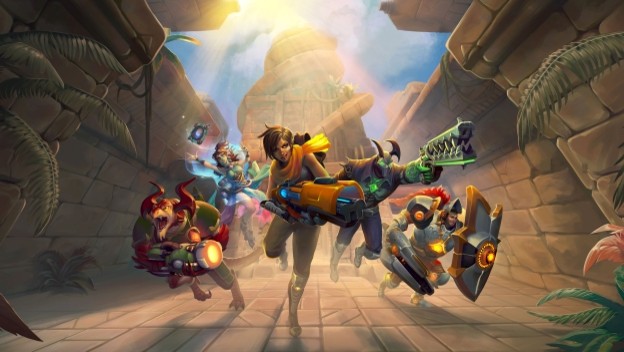Controversies around so-called “pay-to-win” systems in games have been circulating for years now. The idea that players can acquire tangible in-game power at an accelerated rate if they lean on their wallet has become a major cause for concern; some fans have even started analyzing cosmetic skins and the like to determine if they can provide an unfair advantage. Recently, the discussion has mostly focused on everyone’s favorite punching bag: Star Wars: Battlefront II . Since the game is a full-priced, AAA title using a beloved license, the inclusion (despite being temporarily pulled) of microtransactions to gain Star Card power-ups is gauche and unnecessary, to say the least.
However, the pay-to-win accusations have also shifted over to Paladins : free-to-play hero shooter in the vein of Overwatch and Team Fortress 2. With a recent update, it’s implemented a system which allows players to increase the power of characters via cards in loot boxes. Currently, the game is locking the purchase of these boxes to in-game currency, but the community has nonetheless generated a serious amount of backlash. It got me thinking, though: does Paladins ‘ free-to-play nature excuse the implementation of mechanics that could be pay-to-win
Now, before you break out the torches and pitchforks and slap an “industry shill” sign across my chest, hear me out. My train of thought on this has been as follows: in a pay-to-play game, you’re forced to pay an up-front fee just to experience the game in and of itself. Adding in systems to allow higher-paying players to have an easier time with the game essentially carves up the audience into different classes: spoiler alert, the rich guys are probably going to trample the peasants.
In a free-to-play game, though, there is no entry fee. The only thing you’ve really paid the devs in is the time it took to download their title and (usually) set up an account. By that logic, if you were playing said game and suddenly hit a soft paywall (i.e. You can keep playing the game for free, but paying players will have a significant advantage going forward), how does that make it different from a pay-to-play game? In a sense, the only change is that such a “free-to-suck” game still has something to give the player without them dropping a cent. Also, yes, I’m using “free-to-suck” from now on, because it’s easier to say than “free-to-play-unless-you-want-to-actually-be-good”.
Okay, so now I can not only see the torches on the horizon, but I’ve also got a bunch of industry suits kneeling in front of me making doe eyes; I’d better make this quick. The point is, we already have systems kind of like this: they’re called game demos. Even in the multiplayer space, titles like World of Warcraft have allowed you to play for free up to a certain level. While free-to-suck games wouldn’t really be “demos” per se (i.e. They’d be the feature-complete title, just with the player disadvantaged in multiplayer at a certain point), it’d be easy to treat them as such. However, this perspective just makes free-to-suck games frustrating and psychologically manipulative. Personally, I’d be a lot more likely to drop money on a game that told me “Pay $20 to git gud” after 5 hours, rather than one which asked for $20 up front; it’s that notion of, “I’ve started this, so I may as well keep going”.

So, what’s my point in diving down this rabbit hole? Well, I was legitimately curious if I could end up justifying free-to-suck games. On paper (or at least in my twisted mind), the idea seems sound; it essentially prolongs the player paying for the game and lets them decide if getting that extra advantage is worth it. However, it quickly becomes clear that it’s just a more twisted, devious version of a game demo. Besides, the only way it could even have a hope of working would be if the game was split into clear tiers: free players were the weakest, paying players got the “payers advantage”, and that’s that; no additional options to spend money. Does that really sound like something the games industry is interested in? They can’t even seem to accept the notion of “pay $60, get a full game,” so it’s already clear that a flat monetization model like this would be off the table. “We just want to give players choice!” Yeah, the choice to drop $1000 into your game and still feel inferior.
If a free-to-play game wants to make guaranteed money off its players, it shouldn’t be free-to-play. You can incentivize cosmetics all you want, but at the end of the day, that “free” price tag comes with an expectation that I’ll get just as much enjoyment from playing as someone who’s poured their wallet’s contents in. Nobody likes to feel like they suck at a game, and devising systems that say, “You suck because you’re frugal” is little more than a big middle finger to your player base
